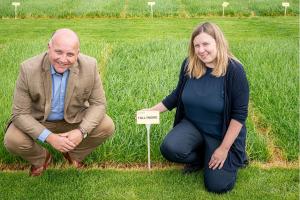Tollymore and Killylea – new AFBI-bred ryegrasses for spring 2024
Date published:
New forage grass varieties Tollymore and Killylea will both be released at the 2023 Winter Fair on 14th December by AFBI’s commercial partner Barenbrug UK Ltd, and seed will be available in selected products in spring 2024.

Both varieties are of the tetraploid type, and therefore bring with them the unique forage characteristics of tetraploid varieties, including the high palatability that often leads to higher voluntary intakes.
Tollymore is an intermediate-maturing ryegrass, heading on the 23 May. The variety is on both the clover and forage grass recommended lists for England and Wales and for Scotland, on which it has produced extremely high yields of grass under both silage and grazing, with particularly high first cut yields, producing extra spring forage at that critical time of the year. Under grazing management, Tollymore was the highest yielding intermediate tetraploid variety on the Recommended Grass and Clover Lists for England and Wales for 2023/24 for both early grazing and spring yields at 111% and 113% respectively, compared with the mean of the intermediate tetraploid controls for total yield. Tollymore also produces high quality grass, with a grazing D-value of 76.6, as well as a silage first cut D-value of 71.4 D and 2nd cut D-value of 73.5, thus combining high yields with quality to produce high metabolizable energy yields, whether utilised for cutting or grazing swards.
Killylea is a late-maturing tetraploid ryegrass variety heading on the 3rd June that, as with all varieties deriving from the AFBI forage grass breeding programme, was bred specifically to suit the local conditions and requirements of growers in Northern Ireland. The variety is currently on the recommended grass and clover list for Scotland for 2023/24 and has been shown to produce extremely high yields across the season, with excellent shoulder growth to help extend the grazing season, improving whole season nitrogen use efficiency. Killylea also combines high yields with an extremely high grazing D-value of 76.5, equalling the highest D-values of any other variety in the late tetraploid group under grazing in Scotland.
Tollymore and Killylea are the latest forage varieties to be released from the hugely successful AFBI forage grass breeding programme based at Loughgall, which is underpinned by funding from the Department of Agriculture, Environment and Rural Affairs (DAERA).
The AFBI Forage Grass Breeding Programme continues to play a vital role in increasing productivity and resilience to climate change from local grassland farms. AFBI has launched more than 30 varieties for local use since 2000, all of which have been proven to show significant improvements compared with older varieties, including nutrient efficiency and digestibility. Each variety has undergone extensive testing in trials across the UK before release to the market and must show a clear improvement against varieties already on recommended lists before inclusion. Use of new forage varieties in mixtures will therefore increase the quality, growth and resilience of swards to optimise both profitability and environmental sustainability on farm
Notes to editors:
AFBI’s Vision is “Scientific excellence delivering impactful and sustainable outcomes for society, economy and the natural environment”.AFBI’s Purpose is “To deliver trusted, independent research, statutory and surveillance science and expert advice that addresses local and global challenges, informs government policy and industry decision making, and underpins a sustainable agri-food industry and the natural and marine environments”.AFBI’s core areas:Leading improvements in the agri-food industry to enhance its sustainability.Protecting animal, plant and human health.Enhancing the natural and marine environment.